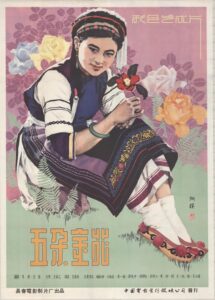New Five Golden Flowers
你是我的一束光
China, 2022, colour, 2.35:1, 97 mins.
Director: Wang Qiang 王强.
Rating: 4/10.
Messily constructed rom-com set in Yunnan province can’t decide what it really is, despite occasional moments.
Fengchuan county, Heming township, Yunnan province, southern China, the present day. After breaking up with his girlfriend, and driving for four days from Beijing, musician Mu Suixin (Yuan Wenkang) starts a job teaching at Laohekou primary school. However, his major interest is in becoming a songwriter and he hopes to form a female group to promote his songs via a competition held by Xiteku Music, for whom he claims to be an executive. Meanwhile, tomboyish, harmonica-playing Pengpeng (Wang Xi), who makes outdoor videos of ordinary people singing for a locally broadcast series called Laughing and Singing 笑着唱歌的我们, is reassigned against her will by her boss Song (Liu Hua) to making documentaries about flowers. While watching her series to find potential singers, Mu Suixin meets Pengpeng – who actually gave him a lift on her motorbike the day he arrived in the village – but she’s dismissive when he tries to get her to join him. Mu Suixin manages to recruit an energetic village head, Duan Wenhong (Meng Tingyi), by promising her to be the group’s leader, and a sociophobic young doctor, Lu Ming (Wang Keru), who’s a friend of his fellow teacher, Pang Xiaopeng (Zhang Dianzhe). He also approaches He Xueyan (Zhang Xiaowan), an extrovert member of a folk-song troupe. Pengpeng has a young daughter, Sun Miaomiao (Li Luoyi), from whom she still hides the fact that the girl’s father, Sun Yutong (Deng Chao), died from cancer; with the help of a friend who impersonates Sun Yutong on the phone, Pengpeng pretends to Sun Miaomiao that her father is busy working in Africa. Mu Suixin has written four songs for his female group but still can’t persuade the stubborn Pengpeng to join, despite the help of Duan Wenhong and the fact that Pengpeng’s BFF, Meng Xiaolin (Sui Yuan), is a member. However, one evening Mu Suixin and Pengpeng become closer when he – a fanatical anti-smoker due to his allergy to nicotine, among many – passes out in a public park and she manages to save him. During the competition Duan Wenhong faints, causing the event to be shut down and making its director (Yang Jinci) angry against Mu Suicin. However, Mu Suixin then has the idea of relaunching his group as New Five Golden Flowers 新五朵金花, in memory of the classic 1959 musical romance film Five Golden Flowers 五朵金花. This brings him closer to Pengpeng, whom he helps in admitting the death of her husband to her daughter.
REVIEW
A messily constructed rom-com set down in picturesque Yunnan province, New Five Golden Flowers 你是我的一束光 has some individual moments and is at its best when the songs, music (by Hong Kong’s Liang Qiaobai 梁翘柏 [Kubert Leung]) and landscape (shot by d.p. Sun Ming 孙明, mega-hit Hi, Mom 你好,李焕英, 2021) are allowed to take over. It’s so bittily paced – as if chunks of the film have simply dropped out – and is led by such an unsympathetic main character, that it never decides exactly what it is – a rom-com, a musical, a light romance, or a tribute to anti-poverty state policy – and ends up devaluing even its good points. This third feature by Hebei-born film-maker Wang Qiang 王强, 48 – who began with the arty Tibetan-language drama Sunshine That Can Move Mountains 被阳光移动的山脉 (2017) and followed that with the period Tibet-set action drama Sky Rise 天慕 (2018), his first commercially distributed feature – took a nothing RMB5.8 million on release in February, around half the amount of Sky Rise.
The script was supposedly written by the esteemed sexagenarian writer Liu Heng 刘恒 – or, more likely, two members of his workshop – who is best known for his collaborations with director Zhang Yimou 张艺谋 (Ju Dou 菊豆, 1990; The Story of Qiu Ju 秋菊打官司, 1992; The Flowers of War 金陵十三钗, 2011) but also with directors like Feng Xiaogang 冯小刚, Xie Fei 谢飞, Li Shaohong 李少红 and Yin Li 尹力. But it’s hard to see any trace of him in this bitty mess, as it is also of experienced writer Yu Baimei 俞白眉 (The Breakup Guru 分手大师, 2014; Devil and Angel 恶棍天使, 2015; Looking Up 银河补习班, 2019) who’s prominently credited with “special planning” 特别策划.
The film starts straightforwardly enough with a voiceover as the lead character (played by Yuan Wenkang 袁文康, 42, the equivocal lawyer in Wrath of Silence 暴烈无声, 2017) drives south from Beijing after splitting with his girlfriend to take a job teaching music in a primary school in the wilds of Yunnan province. His real agenda, however, is to create a female singing group and become a famous songwriter; and as he recruits local women to join him, and encounters a tomboyish documentary film-maker who refuses to help, the film breaks up into a series of almost unconnected storylines, with no strong tentpole.
Most of the final third is taken up with the problem of the film-maker/single mother revealing a secret to her young daughter – a problem with which the main character helps – which means abandoning many of the film’s other characters. Relative newcomer Wang Xi 王西, 28, who made a fine debut as a cute high-school teacher in Looking Up, makes a strong mark here in a very different role as the tomboyish female lead, though her relationship with the self-serving songwriter is patchily developed and never seems to form the film’s main spine. (The fact that Yuan has to work hard to make him at all likeable also doesn’t help.) Other actors momentarily make their mark, from veteran Liu Hua 刘桦 as the film-maker’s slyly comic boss to actress Meng Tingyi 蒙亭宜, 40, as a lively village head. Popular actor-director Deng Chao 邓超 (Looking Up) cameos in flashbacks as the film-maker’s late husband.
 Further diversions include copious anti-smoking propaganda (the main character has an allergy to nicotine) and an action finale that seems to come out of nowhere. Viewers who leave when the end credits start will also miss a plot twist. The film’s Chinese title means “You Are My Ray of Light”. The story and the film’s English title reference a famous 1959 musical romance, Five Golden Flowers 五朵金花 (dir. Wang Jiayi 王家乙), which is also set around Dali city, Yunnan province, but has a completely different plot and much more local ethnic flavour (see poster, left).
Further diversions include copious anti-smoking propaganda (the main character has an allergy to nicotine) and an action finale that seems to come out of nowhere. Viewers who leave when the end credits start will also miss a plot twist. The film’s Chinese title means “You Are My Ray of Light”. The story and the film’s English title reference a famous 1959 musical romance, Five Golden Flowers 五朵金花 (dir. Wang Jiayi 王家乙), which is also set around Dali city, Yunnan province, but has a completely different plot and much more local ethnic flavour (see poster, left).
CREDITS
Presented by Yunnan Minzu Film Studios (CN), Shanghai Maoyan Pictures (CN), Tianjin Century Lecheng Culture & Technology (CN), Beijing Yizao Culture Communication (CN). Produced by CPC Yunnan Province Publicity Department (CN).
Script: Liu Heng, Peng Mengqi, Ye Jun (Liu Heng Workshop/Yizao Wenhua). Photography: Sun Ming. Editing: He Yiping. Music supervision: Liang Qiaobai [Kubert Leung]. Art direction: Li Anran. Styling: Liu Qian. Sound: Lin Xuelin, Feng Yanming. Visual effects: Jiang Chao, Huang Canzhou (Kernel). Special planning: Yu Baimei. Executive direction: Xi Zi.
Cast: Yuan Wenkang (Mu Suixin), Wang Xi (Pengpeng), Meng Tingyi (Duan Wenhong, village head), Sui Yuan [Suijun Drolma] (Meng Xiaolin, Pengpeng’s BFF), Wang Keru (Lu Ming, doctor), Zhang Xiaowan (He Xueyan, folk singer), Wu Yufang (Wu Yuemin, Pengpeng’s mother), Li Xiaoqiang (Gong, cattle-farm worker), Zhang Dianzhe (Pang Xiaopeng, teacher), Li Luoyi (Sun Miaomiao, Pengpeng’s daughter), Yang Yikun, Bi Ying, Yu Lihong, Zhang Huiling (female folk-music quartet), Deng Chao (Sun Yutong, Pengpeng’s late husband), Liu Hua (Song, broadcasting head), Yang Liping (herself), Liang Chao (old cattle farmer), Yang Jinci (Gu, competition director).
Release: China, 25 Feb 2022.
